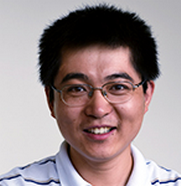Webinar - Magnetic Tunnel Junctions for Non-Conventional Computing
Sponsor: IEEE Boston/Providence/New Hampshire Reliability Chapter
Please visit www.ieee.org/bostonrel
Host: IEEE Boston/Providence/New Hampshire Reliability Chapter
FREE Webinar
Magnetic tunnel junctions (MTJs) represent the most useful devices coming out of spintronics research. Besides serving as the key components for magnetic field sensors and digital magnetic random access memories, magnetic tunnel junctions have recently been studied as building blocks for non-conventional computing, via utilizing their functions of non-linearity, stochasticity, etc.
In this presentation we begin with the fundamental aspects of these devices and then share some of our research, as well as reliability-related issues found.
In one of the early works, we demonstrated that by designing multi-domain MTJs, one can realize synaptic devices and activation function devices for convolutional neural network, where the synaptic weight and threshold function are realized by controlling the position of magnetic domain walls. Recently, we explore the possibility of building Hopfield neural network with MTJs by using their oscillatory or probabilistic switching properties. These computing hardwares, known as Boltzmann machine or Ising machine can be used to solve NP-hard combinatorial optimization problems more efficiently than traditional von Neumann architectures. Particularly, we look into the dynamical behavior of an electrically coupled array of gigahertz spin Hall nano-oscillators, a device where the magnetic layers of the forming MTJs undergo persistent precession. By developing a general analytical framework that describes injection locking of spin Hall oscillators with large precession angles, we show the mapping between the coupled oscillators’ properties and the Ising model. We then integrate the analytical model into a versatile Verilog-A device that can emulate the coupled dynamics of spin Hall oscillators in circuit simulators. This abstract model allows for the analysis of the performance of the spin Hall oscillator network at the circuit level using conventional electronic components and considering phase noise and scalability. The results provide design insights and analysis tools toward the realization of a CMOS-integrated spin Hall oscillator Ising machine operating with a high degree of time, space, and energy efficiency.
Date and Time
Location
Hosts
Registration
-
 Add Event to Calendar
Add Event to Calendar
Loading virtual attendance info...
- Contact Event Host
-
Michael W. Bannan, Chair
IEEE Boston/Providence/New Hampshire Reliability Chapter
Speakers
 Luqiao Liu of MIT
Luqiao Liu of MIT
Magnetic Tunnel Junctions for Non-Conventional Computing
Biography:
Luqiao Liu is an Associate Professor of Electrical Engineering at Massachusetts Institute of Technology. He received his B.S. in physics from Peking University in 2006, and Ph.D. in Applied Physics from Cornell University in 2012. He worked as a Research Staff Member at IBM Watson Research Center before joining MIT in 2015. Luqiao’s current research focuses on spintronic material and devices for memory and logic applications. Luqiao Liu has received McMillan Award, NSF Career Award, Air Force Young Investigator Award, Sloan Fellowship, and International Union of Pure and Applied Physics Young Scientist Award.
Agenda
11:00 AM Technical Presentation
11:45 AM Questions and Answers
12:00 PM Adjournment
The meeting is open to all. You do not need to belong to the IEEE to attend this event; however, we welcome your consideration of IEEE membership as a career enhancing technical affiliation.
There is no cost to register or attend, but registration is required.

